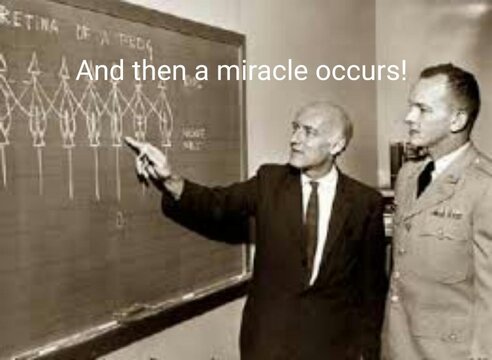I had said of
@Constance a few posts ago that at time it seems as if she seeks to explain the origin and nature of the personal (consciousness) at the personal level.
I must have been unclear. My view is that consciousness as we humans experience it is necessarily 'personal' -- i.e.,
self-referential, self-reflexive -- as 'knowing'/understanding that our individual experiences are 'our own'. Our experiences in the world happen to us as individuals. But I think it's also clear that we participate, consciously and subconsciously, in
transpersonal experiences with others, most obviously with others with whom we immediately co-inhabit the environmental niches, societies, cultures into which we are born and continue to exist.
@Burnt State or
@Michael Allen asked, wondered, at some point in the last few pages how we are able to find any 'meaning' in our experienced worldly situations (which of course include interpersonal actions and reactions, but also include the whole sense we have of the world that encompasses us all, in which we dwell together). The response from phenomenological philosophy and semiotic analysis of human experience and consciousness is that we
can't not find meaning in the interpersonal world we inhabit, from early childhood (even infanthood) in our temporal, sensual, and increasingly reflective existences on this planet.
ETA: meaning also being grasped in what we see of the lived experiences and behaviors of animals, and in manifold other expressions of nature to which we respond aesthetically and with pleasure and joy except in situations of turmoil, immediate threat to our lives and/or the lives of other creatures, drastic lack of sustenance, sickness and death of others of all kinds.
I also have evidently not been clear enough about my view of the origin of consciousness, in which I follow Panksepp in recognizing that consciousness has originated in protoconsciousness in nature with the appearance of primordial species of life [capable of affectivity and germinal awareness] and evolved in complexity over eons of time in the evolution of species increasingly capable of awareness, self-referentiality, seeking behavior, and cooperative behavior within and sometimes across species.
And the I said that I was assuming that the personal (aka consciousness) arose at the sub-personal level. The quantum level, say.
But the quantum level still is the personal level.
Is it? If it is, how can that be demonstrated rather than simply hypothesized?
I take this to be what
@Michael Allen means when he says we can't even ask relevant questions about being/questioning-ing.
I think the history of human philosophy, science, religion, and art stand against that claim.
We—the conscious subject—can't get below the personal level.
Many people I know can and do 'get below the personal level' in their conscious and subconscious responses to the conditions, afflictions, and suffering of others (including animal 'others') in the local world we co-inhabit. Moral and ethical issues have been central since the beginnings of our species' written philosophy, and anthropology and archaeology have disclosed signs of both ontological thinking and moral/ethical concerns among our prehistorical forebears.
It's similarly said that we can't get behind consciousness.
I think that's true, but it is a different kind of question from the questions concerning
the nature of reality [locally and beyond visible horizons] and what we humans should do with our lives in shaping our social mores in our existentially lived worlds.
But what I take
@smcder to be saying is that "ah, but if we say what-is can't be known, then we are saying we know the unknown; that is, that it's unknownable." Or, we can't say what-is is unknowable because that's self-contradictory.
At the same time, that doesn't mean it is knowable. To us.
I follow and support what Steve has written. What we can 'know' about the nature of 'reality' is contingent on that which we are capable of
experiencing and
measuring within the natural and cultural 'worlds' in which we exist. The fact is that we experience more than we can measure, account for and define, objectively. A further fact is that there is no firm dividing line between what is objectively measureable and definable in our experience and the subjectivity we bring to everything we see, hear, touch, and otherwise sense in the world in which we feel both 'at home' and 'not at home'. We can't leap from situated, historically qualified, existentially lived experience of be-ing to a view from everywhere or a view from nowhere.
But it may be. If we assume that minds are essentially computational programs essentially running on essentially a software platform beyond our ken, then the above logic does apply.
I can't join you in that assumption, even theoretically, given what we (our species) has learned about the evolution of consciousness as realized in the evolution of species on our planet. As I see it, neither interactions perceivable in the q substrate nor a computational program conjectured to have produced the physical universe/cosmos we can measure
[to the extent that we can measure it] from the 'Big Bang' forward can begin to make sense of the lived experiences and developing consciousnesses germinated with the origin of life itself in our own distant past.
But minds may not essentially be computational programs essentially running on essentially a software platform beyond our ken. The origin and nature of being may indeed lie outside the personal level, and thus beyond personal logic and physical mechanisms, but it might not be unknowable.
Right. Thus Heidegger distinguished between Being and being, and concluded that what we can know of 'Being' must begin with an understanding of that which we experience in our own be-ing -- which is always, for phenomenological philosophy, situated "being-in-the-world" that we can know only incompletely and through its phenomenal appearances to us
as and
where we live.


